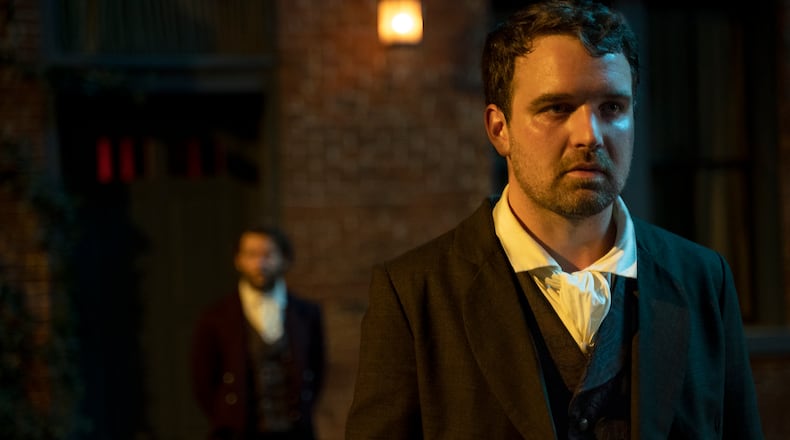The thought-provoking, eight-episode series stars splendid newcomer Mallori Johnson as Dana. The show is adapted by two-time Pulitzer Prize-nominated playwright Branden Jacobs-Jenkins (“Watchmen”) from the award-winning 1979 sci-fi novel by Octavia E. Butler. The thrillingly atmospheric pilot was directed by Janicza Bravo, best known for directing episodes of the FX comedy “Atlanta,” and, most recently, the award-winning independent film “Zola.” Executive producers include Emmy winners Joe Weisberg and Joel Fields (“The Americans”) and Academy Award-nominated director Darren Aronofsky (“Black Swan”).
Credit: RICHARD DUCREE/FX
Credit: RICHARD DUCREE/FX
“Kevin is sort of a millennial Renaissance Man,” said Stock, 34. “He’s at a place in his life in which he’s maybe on the upswing. He’s sort of open to new things and trying to improve himself. He meets Dana and is challenged in ways he doesn’t expect. He falls in love but it’s the complications of falling in love mixed with the complications of phenomena that doesn’t happen to anybody else in the world.”
The Brooklyn-based actor said the pilot was filmed in Los Angeles in October 2021. Once the show was picked up for a full season, filming resumed in March 2022 in Atlanta and continued for five months. Attracted to the script as a Jacobs-Jenkins fan and fully aware of how daring the show would be, Stock felt he was ready to be challenged as an actor in a deeper, enriching way. He knew his time had come.
“I’ve never been an actor who sort of knows what the next thing is going to look like,” he said. “I have sort of an idea in my head of the way I want to challenge myself that can be abstract and specific. It’s also an opportunity to play a much larger role in telling that story. There are few times when you get that sort of ping of recognition, and this is definitely one of them.”
Finding levity in terror
A unique conceit of the show involves Dana and Kevin being able to navigate the cruelties of their early 19th century surroundings within a contemporary mindset. From a dramatic standpoint, Dana confidently holding her own in the presence of plantation owner Thomas Weylin (Ryan Kwanten from HBO’s “True Blood”), particularly as a Black woman who can read, speaks volumes.
Credit: RICHARD DUCREE/FX
Credit: RICHARD DUCREE/FX
As Dana searches for answers to her past, Kevin provides moments of levity. For example, he finds solace in his bedroom listening to the music of Joan Armatrading on his cell phone and manages to play a few bars of Journey’s “Open Arms” on Weylin’s piano. Also, during a quiet moment of calm and connection, Kevin shares this epiphany with Dana: “If you can, somehow, shut out the fact that this whole thing is happening in a terrifying and horrible time and place, it’s kind of like a retreat.”
“Kevin brings a lot of levity to the season but he also functions, for a modern audience, as a way to experience the terror,” said Stock. “Kevin gets to be our modern response to the abuses and horrors that he sees. But that’s also a product of his privilege and acknowledging the fact that Kevin is a good guy but he’s still blind and ignorant in certain ways, even in the context where these systems of oppression are very much at play. Brandon’s writing is funny, a little distasteful, complicated and makes you think. You see a white man in a dangerous situation but his danger in no way compares to the danger Dana is in as a Black person in 1815. The discrepancy between their two experiences, though both horrible, is one of the reasons the show is so interesting.”
Journey to the past
Stock, an Oakwood High School graduate, traces his acting roots back to the Human Race Theatre Company and Muse Machine.
Credit: HANDOUT
Credit: HANDOUT
During the 2000-2001 season, he debuted with the Human Race, notably playing the title role in a youth summer stock production of “The Little Prince.”
“Micah was this young, fresh face with an earnest delivery,” recalled Kevin Moore, Human Race Artistic Director Emeritus. “Later that season I would co-direct him in an outrageous comedy, ‘Resident Alien.’ Among a lot of crazy adults, he was refreshingly calm and professional. Next came the musical workshop of ‘24 Hours’ in 2003. He discovered his singing voice and blew the audience away as a young teen volunteering at a teen suicide hotline. Micah came back for our first Miriam Rosenthal event at the Schuster Center in 2015, rendering a stunning monologue from ‘The Glass Menagerie.’ Micah is always a joy to work with because it is never work. I am so proud of his successes.”
With Muse Machine, and displaying a maturity beyond his years, he appeared in such shows as “How to Succeed in Business Without Really Trying,” “On the Town,” Disney’s “Beauty and the Beast” and “Thoroughly Modern Millie.”
“Muse Machine is completely instrumental in my life and career in uncountable ways,” said Stock. “I’m also so proud of (Muse Executive Director) Ruth Reveal, who is going to bring a really special energy to Muse Machine.”
In addition, the SUNY Purchase graduate received a 2015 Tony nomination and Theatre World Award for his outstanding Broadway debut as Gus P. Head in the starry revival of Terrence McNally’s comedy “It’s Only a Play.” In recent years, he appeared in the film “Brittany Runs a Marathon” and TV shows such as “Bonding,” “The Right Stuff” and “Escape at Dannemora.” He has also recently completed production on the feature film “Maggie Moore(s)” opposite Tina Fey and Jon Hamm.
Social science fiction
Stock is hopeful a second season will allow more exploration of character and storytelling beyond the novel’s foundation.
“Looking forward to a potential second season, the exciting thing about television is that we’ve expanded the world (of the novel),” he said. “There is potential to experience Kevin’s time travel in a different way. To me, this show was never going to be told in one season.”
Above all, he views “Kindred” as an insightfully relevant tale.
“One overarching (theme) of the show is family – how we require them and can’t escape them,” he added. “People refer to Octavia’s genre as social science fiction. I think it’s hard not to look at ‘Kindred’ and see how some of these things are so directly mirrored in our society today.”
About the Author






